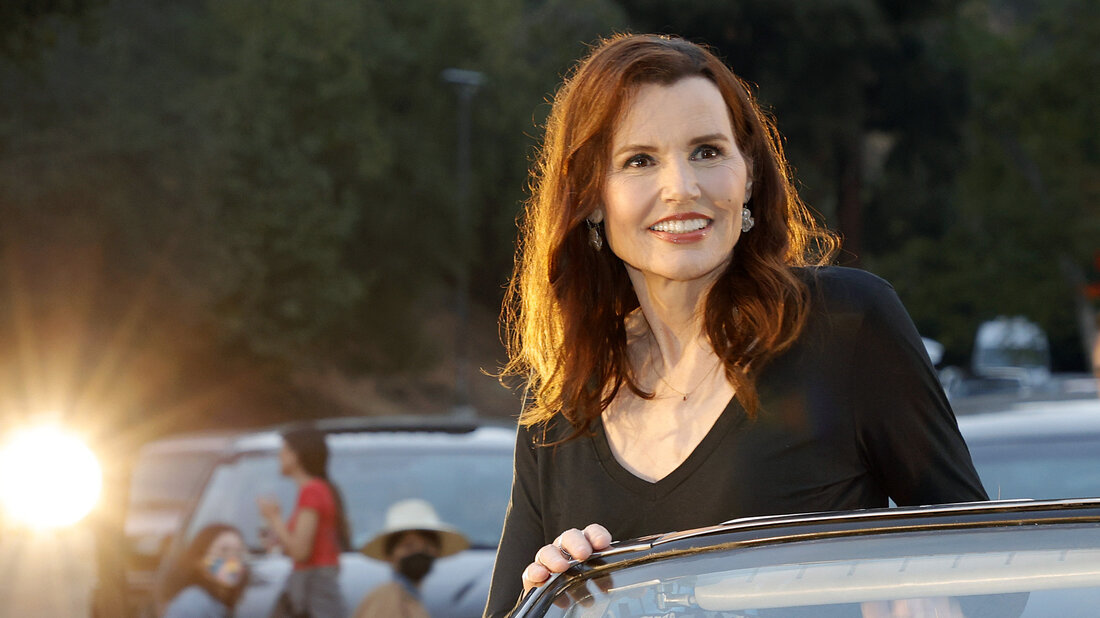Geena Davis on Paving the Way for America’s First Female President
The concept of a female president in the United States was once considered a distant dream. However, in 2005, the ABC series Commander in Chief took a bold step by portraying Geena Davis as America’s first female president, Mackenzie Allen. Although the show lasted only one season, its cultural significance and impact on the conversation surrounding gender in politics were profound. With a storyline echoing today’s political climate, the show set the stage for future discussions about women in leadership, long before the 2024 election where Vice President Kamala Harris emerged as a prominent figure.

In this article, we’ll explore the significance of Commander in Chief, its role in shaping public perceptions of female leadership, and how its legacy may still resonate in American politics today.
The Plot of Commander in Chief: Fiction Ahead of Its Time
When Commander in Chief first aired in 2005, it introduced a narrative that was both unique and ahead of its time. The plot followed Vice President Mackenzie Allen, portrayed by Geena Davis, as she ascended to the presidency after the sudden death of President Teddy Bridges. Mackenzie Allen, an Independent, was the first woman to serve as Commander in Chief of the United States in this fictional world.
The parallels between the show’s plot and real-life politics are striking, especially considering the 2024 election where Vice President Kamala Harris, a woman of color, became the Democratic nominee after President Joe Biden faced health struggles. However, unlike the show’s Republican President Bridges, the real-world scenario involves a Democratic president, highlighting both the similarities and differences between fiction and reality.
Commander in Chief was groundbreaking in its depiction of a female president and raised important questions about whether the American public was ready to see a woman in the nation’s highest office, even if only on TV.
Geena Davis as President: A Trailblazer for Women in Politics
Geena Davis’s portrayal of President Mackenzie Allen was more than just a performance—it was a cultural statement. Davis, already an advocate for gender equality in Hollywood, embraced the role, hoping it would inspire viewers to imagine a future where a woman could lead the country. In interviews, Davis often spoke about how she believed that seeing a woman president on-screen could help normalize the idea for the public.
Rod Lurie, the show’s creator, was equally passionate about the impact the series could have. He believed that Commander in Chief had the potential to change the world by making the concept of “Madam President” a part of everyday conversation. “If we all do our jobs… We’re going to change the world,” Lurie recalled telling ABC executives. The show’s creators knew they were tackling a groundbreaking narrative that could influence public opinion about women in leadership.
The Reception of Commander in Chief: A Short-Lived Success
When Commander in Chief first premiered, it was a ratings success, even beating the popular medical drama House. Audiences were captivated by the idea of a female president and Davis’s compelling performance. However, despite its initial popularity, the show struggled to maintain its momentum and was canceled after just one season. Many speculated that the show’s decline in viewership was a reflection of the public’s uncertainty about the idea of a woman president—a concept that, at the time, still felt far from reality.
While the series was short-lived, its cultural significance cannot be denied. It marked a moment in television history where a woman was portrayed as the leader of the free world, a role rarely seen in Hollywood. Prior to Commander in Chief, few films or TV shows had explored the idea of a female president. One notable exception was the 1964 comedy Kisses for My President, which featured Polly Bergen in the lead role. Decades later, Commander in Chief revisited the concept, this time with a more serious and politically charged narrative.
The Legacy of Commander in Chief and Its Relevance in 2024
Fast forward to 2024, and the conversation about women in politics has evolved dramatically. Vice President Kamala Harris has already made history as the first female, first Black, and first South Asian vice president of the United States. As she steps into the spotlight as a potential presidential candidate, the groundwork laid by shows like Commander in Chief becomes even more relevant.
Rod Lurie, the show’s creator, believes that Commander in Chief played a role in preparing America for the possibility of a female president. “Without a doubt,” Lurie stated when asked if the show helped shift public perception. He believed that the show’s portrayal of Mackenzie Allen made the idea of a woman president more familiar and acceptable to audiences.
Although Commander in Chief did not have the long run that its creators had hoped for, its influence can still be felt in today’s political landscape. The show opened the door for more serious discussions about gender and leadership, helping to normalize the idea of a female president long before it became a reality in American politics.
Breaking Gender Barriers in Hollywood and Politics
The significance of Commander in Chief extends beyond its political narrative—it also marked a pivotal moment in Hollywood’s portrayal of women in positions of power. For years, women were often relegated to secondary roles in political dramas, rarely seen as the ones making the big decisions. Commander in Chief broke that mold, placing a woman at the very center of political power.
Geena Davis’s performance was not just about playing a character—it was about challenging long-standing gender norms both in Hollywood and society at large. Davis has long been an advocate for gender equality, and her role as Mackenzie Allen was a testament to her commitment to breaking down barriers for women.




